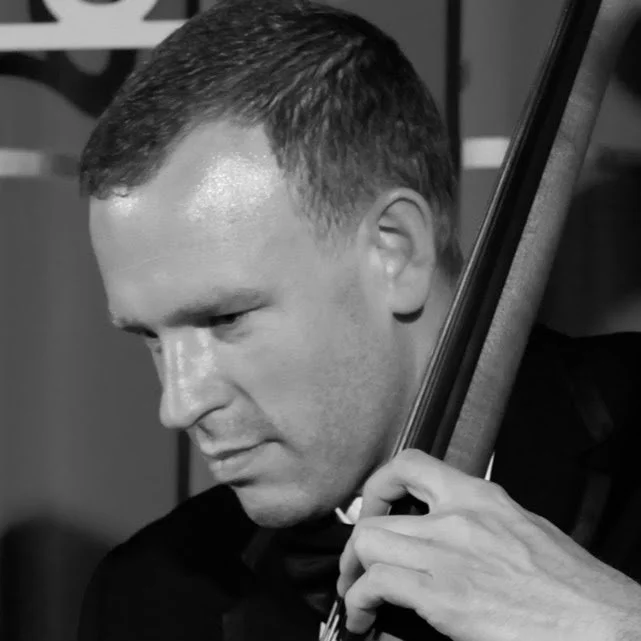How to sing with a big band by Joe Pettitt, leader of the Len Phillips Big Band
I managed to grab a few minutes between sets with Joe Pettitt bass player and leader of the Len Phillips Big Band. As well and finding out how you can get hired by the band for your cabaret show, we talk about Joe's steep learning curve in moving from band member to band leader, we discuss the future big band music and the band's latest album with singers Eleanor Keenan and Matt Ford.
Keeping both sides happy
Being a band leader has made Joe more sensitive to the pressures that other band leaders are under. As well as keeping seventeen musicians happy and satisfied musically, there is of course the “other side”, the audience. Addressing a room full of expectant big band fans wasn't part of Joe's training as a musician and he's had to learn from experience. Though he's learned a few dos and don'ts he's also mindful that people come to hear the music and that's where the focus should be.
“You have to be as natural as possible when you're on stage,” he told me, “If you're not they can see right through you. If you go up there and take the Mickey out of yourself a little bit they'll forgive you if you make the odd mistake. Don't try and be someone you're not. Unless you're not a very nice person that it, then you probably should pretend to be someone else!”
As well as the band's two resident singers, Joe occasionally hires cabaret acts, someone with their own show where the focus is perhaps a little less about the music and more about the personality of the artiste. Joe explains, “I'm looking for a full routine with links that are well thought out, the tunes flow from one to the next, good business with the audience, maybe walking around the room, lighting cues and so on. All the different things to make it more of a show, a polished 45 minute production.”
Opportunities for singers
I'm know a lot of very good singers who would love the chance to sing with the big band, never mind have their own show, so it's surprisingly to hear Joe say, “it's really hard to find good cabaret singers”. He explained, “There are a few people who can do a cabaret show but the biggest hurdle is having the music. Nobody has the outlet like they used to when big bands were playing all around the country and every singer had a pad of big band music. Now, there are so few opportunities to work with a sixteen piece orchestra that no one's got the music they need. That makes it really tricky to find people.”
If you're a singer and chomping at the bit, a word of caution. Your arrangements need to be very clear and very well written. As I say in chapter 7 of Cabaret Secrets: Love You Musicians, it's easy to buy cheap arrangements off the internet but they might be crap. If you turn up to a rehearsal with a pad of arrangements that don't work you might never be asked back.
Here's Joe Pettitt's dos and don't for singers working with a big band:
The rehearsal is for the band not the singer
With so many musicians and so little rehearsal time the music needs to be well arranged and very clearly written. There simply isn't the time to go over charts to correct mistakes and figure things out. Don't skimp on charts and check everything very carefully before handing it to the band.
Avoid complicated arrangements
If rehearsal time is limited (and it nearly always it) don't use tricky arrangements. Sure, they might sound great in the end but there simply isn't the time to spend 10-15 minutes on one chart when there are another 12 to get through. As Joe says, “Simple is good. If you've got two or three days to sort everything out great but if you try to be too clever with only an hour to rehearse the reality is the band will be soon be annoyed and uncomfortable.”
Know your stuff
Gone are the days when the cabaret artiste turns up with their own Musical Director who can run the rehearsal on their behalf. You, the singer, need to know your charts inside out. I can't read music but I do know that letter 'O' of my arrangement of Mack the Knife is a bit tricky and needs to be looked at before we run the whole tune. This means I can help speed the rehearsal up and catch any issues early. You need to know your tempos, who is counting the band off and who is directing any changes in tempo. You also need to provide the conductor with a list of cues, for example, before I sing my Bacharach Medley I end my link with “...on a national tour celebrating the music of Burt Bacharach.” Knowing this in advance means the conductor can start counting the orchestra off when I say “the music” so the tune is playing as soon as I finish my sentence. Avoiding that second or two of dead space between a link and tune starting is one way to add polish and professionalism to your act.
Don't forget the conductor
If you're working with a big band find out if there is a conductor leading the band or it's one of the musicians. If you've got a conductor find out what music they like to conduct from. Some may want the whole score showing exactly what everyone plays, some may want a piano part. In my case with the Len Phillips Big Band Joe was happy to use the Alto 1 parts which gave him just enough information.
The future for big band music
Joe's confident about the future of big band music, “People were saying big band music was dying out ten years ago but it's still here. A lot of our fans are 70 years old but that means 50 years ago you were out partying the '60s listening to The Kinks, The Beatles and The Who. It seems as people get older they do grown into big band music.”
Michael Bublé, Rod Stewart and Robbie Williams have helped to get big band music back on the radio. This means new listeners are being introduced to the Great American Songbook, they hear the songs, form a bond with them and then love to hear them played live with a big band. That's good news for all of us.
Recorded at Hayling Island 29th October 2014

